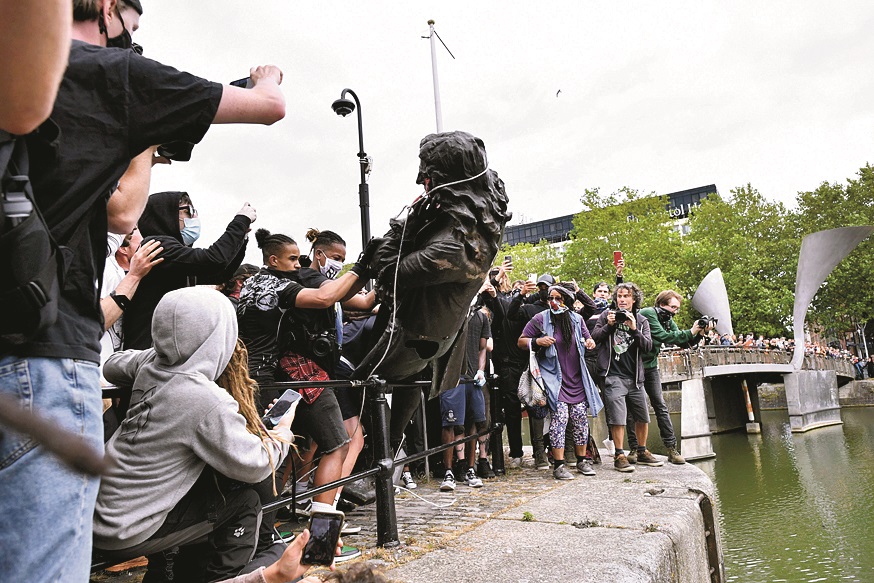The statue of the 17th century slave trader Edward Colston, which was toppled by “Black Lives Matter” protesters in Bristol last Sunday in images that have been flashed around the world, was secretively pulled out of the Harbour on Thursday and taken to a “secure location”.
Bristol City Council posted a video clip on Twitter of the monument being fished out of the water and said: “Early this morning we retrieved the statue of Colston from Bristol Harbour. It is being taken to a secure location before later forming part of our museums collection.”
A hit list of some 80 statues with slave trading or imperialist connections has been drawn up for removal, among them Cecil Rhodes in front of Oriel College in Oxford, Robert Clive in the market square in Shrewsbury, and the founder of the Scouts movement Robert Baden-Powell from the waterfront in Poole.
The former UKIP leader Nigel Farage has described the activists in the Black Lives Matter campaign as the “British Taliban” and predicted a violent backlash from whites if the campaign is allowed to continue. Some of the fringe elements are even pressing for the removal of the Gandhi statue in Leicester.
Road name change
The leader of Ealing Council in London, Julian Bell, confirmed to The Telegraph that there was now a proposal to change the name of Havelock Road, site in Southall of the Sri Guru Singh Sabha.
He said a section of the road could be renamed after Guru Nanak. Bell pointed out that the mayor of London, Sadiq Khan, has announced the setting up of a “Commission for Diversity in the Public Realm” to examine the possible removal of statues and the renaming of roads, schools and public buildings with links to the worst aspects of Britain’s slave trading and colonial past.
Major-Gen Henry Havelock (1795-1857), long considered a hero in Britain and a villain in India for ruthlessly putting down the 1857 sepoy uprising, merits an imposing statue in Trafalgar Square and countless street names across the UK.
In Southall, there is a private estate and a school named him. White residents will not necessarily favour a name change because it will affect their property deeds.
It will be recalled that in December 2018, Narendra Modi announced the renaming of three islands in the Andaman and Nicobar archipelago – Ross Island to Netaji Subhas Chandra Bose Dweep, Neil Island to Shaheed Dweep and Havelock Island to Swaraj Dweep.
The renaming of Havelock Road is not yet a done deal though Bell said he hoped the change will be agreed by November. The Labour MP for Ealing Southall, Virendra Sharma, who has been campaigning for the change since he was a local councillor in the 1980s, said: “Names like Havelock belong in books, classrooms and museums, not on the streets to be celebrated. I have long campaigned for schools to teach more about our imperial past, not just the great strides made but also the shameful thuggery and violence.”
Incidentally, “thuggery” was the word used by Prime Minister Boris Johnson to describe the behaviour of some protesters who have attacked police and public memorials – such as Gandhi’s statue in Parliament Square.











